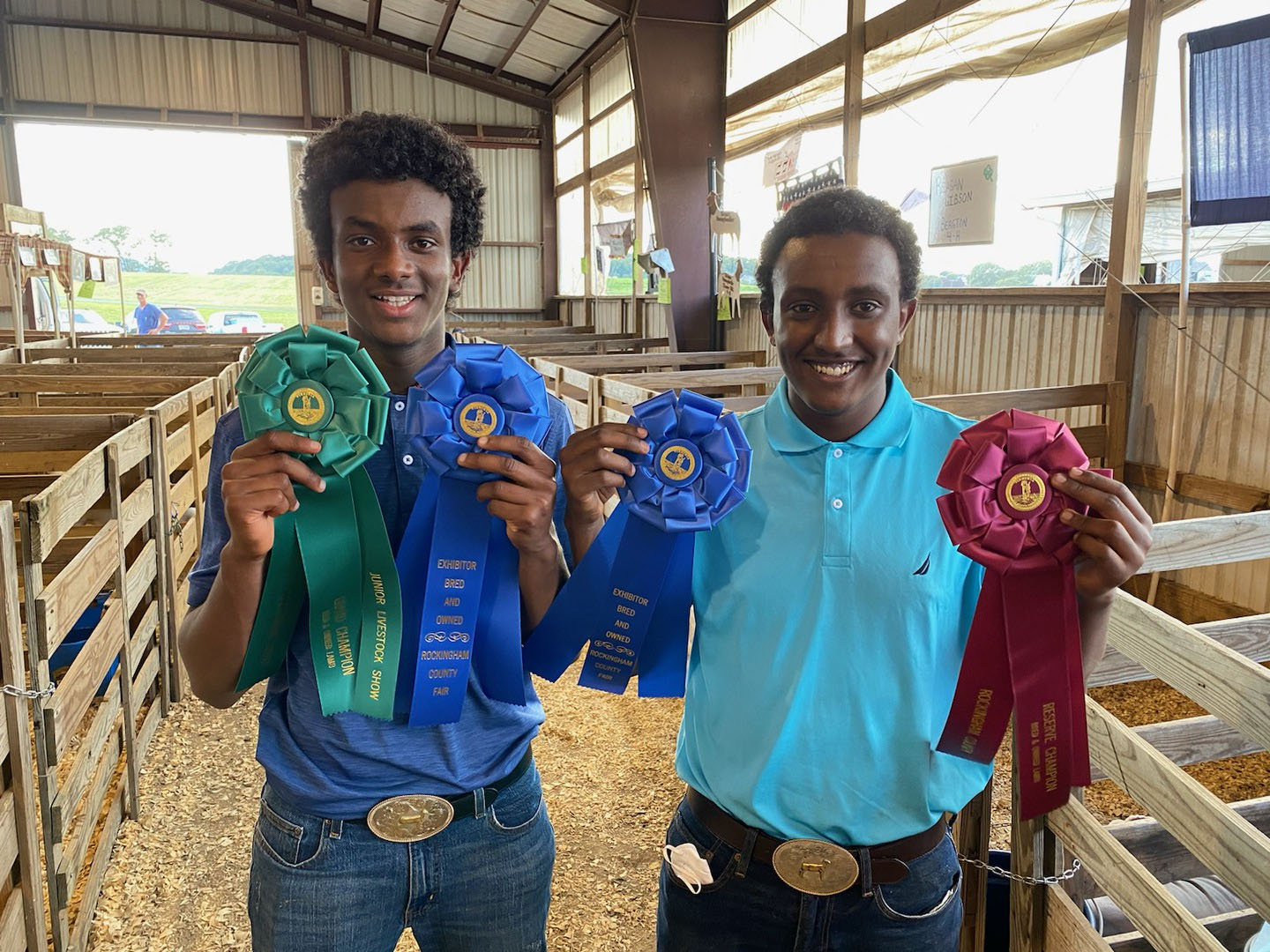Six years ago, local farmer Jim Mumaw and his daughters Holly and Katherine started mentoring a group of refugee youth including Robel and Mickey. The Mumaws taught them how to raise sheep and show them at the Rockingham County Fair.
When Mickey’s family came to the United States as refugees from northern Ethiopia, they were looking for local places to buy lamb to eat like they did in Ethiopia. Mickey’s father found Mr. Mumaw’s farm and was one of the first customers to buy lambs directly from him. Through this relationship and the joint efforts of CWS Harrisonburg and 4-H, the mentorship arrangement and farm project took shape.
The first year Robel, Mickey and the others showed at the fair, they didn’t win. Disappointed, Robel asked Mr. Mumaw what they needed to do to win. This year, after years of hard work, patience and comradery, Robel and Mickey won two of the most prestigious prizes at the Rockingham County Fair: Grand Champion Bred and Owned Sheep and Reserve Grand Champion Bred and Owned Sheep. These are especially prestigious for the serious farmer because the only way to be eligible is to have owned the mother and bred the lamb on your own farm, and the only way to do that is to really put in the work – you can’t just go out and spend a lot of money on a nice animal and win. Needless to say, we are beaming with pride to see what these young folks have accomplished!
When we talked with Robel and Mr. Mumaw about the experience, some common themes emerged: hard work and perseverance, good citizenship and lifelong learning. Here’s what they had to say about how they got started, the relationships they formed, and what they learned along the way.
Robel: “I’ve been raising lambs for six years now and it’s been a fun experience showing. We got started … as a way to do something over the summer. Our first year was five of us, and then over the years it just gradually became me and Mickey. The prize that I won was Grand Champion Bred and Owned Sheep, which means that the lamb you showed was born on your farm and you owned the mother. That’s the only way to be eligible.”
Mr. Mumaw: “At first, our involvement as a family was really about being a host farm and doing the work of teaching the children and serving as supervising adults during fair week. The animals were always considered the children’s and the first year they showed, they raised one lamb to show and one lamb to feed their families. Along with our family’s increased involvement with [Mickey and Robel], the kids have also had increased involvement with the farm. At least one of them comes to the farm almost every weekend throughout the year. Sometimes they help with the lamb butchering business (which I pay them for) but also they help out with mucking out the barn, feeding, watering, lamb care and other farm chores.
Robel, on lessons learned and the 4-H experience: “When I’m working with the animals I have learned to be patient because sometimes animals are not fast learners at all and it’s very repetitive. You have to keep doing the same thing until the animal learns to set up its legs or brace. 4-H has taught me how to be a better person for the community. We have done lots of community projects like trash pickup along an adopted highway and a lot of other stuff. [We got to do lots of fun activities too] like one time we visited a Route 11 chips factory and saw in action how they made potato chips.”
Mr. Mumaw, on his favorite parts of mentoring kids on his farm: “I really enjoy all of it. It’s all my favorite. Seeing them succeed is great. Seeing them fail, but learn a great lesson, is great. Having comradery is great. Watching them mature and grow is great. Farming is so much harder than I ever imagined, but having people to share the blessings and the curses with–that’s my favorite part. Shoveling poop until your hands hurt isn’t very much fun, but the joy of getting the job done and doing it well demands a high five and a good pat on the shoulder. We established the farm was so our kids could learn how to work hard and appreciate how hard it is to raise food and animals and to take nothing for granted. Passing on that work ethic and life philosophy is important to me.”
Robel agrees, “It’s very fun. It taught me that working hard has good rewards and that life is more than just winning, because you could go into the ring and an animal won’t cooperate but that doesn’t mean you worked less hard.”
“I live in Harrisonburg but I am very close to the Mumaw family where I raise lambs. I’ve only got two more years of showing and it’s just incredible how much time flies and how much I’ve progressed over the years. And that worked out this past fair when I won.”
It is stories like these that remind us what is possible when neighbors make connections–sometimes outside of their usual circles–and offer each other the gifts of dedication, hope and support. The Shenandoah Valley is replete with natural beauty, but it is made truly special by the warmth and hard work of the individuals who have come to live here, whether they arrived recently or have been living here for generations. We are grateful to Robel for sharing his story and glad that we have folks like him as neighbors. We are also grateful to Mr. Mumaw and his family for the gift of mentorship and friendship.

